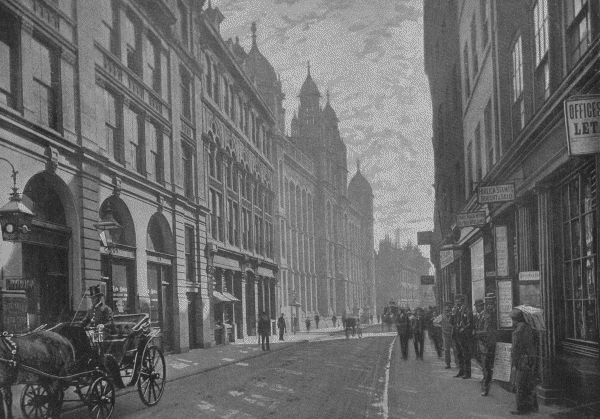[ ... back to main menu for this book]
Record Office,
Fetter-lane, Fleet-street. Collection of Manuscripts, &c., including
Doomsday Book. With the exception of the search-rooms the building is not
generally open to inspection. The search-rooms are approached from the entrance
in Fetter-lane. The visitor, on entering the building, faces a bust of Lord
Langdale, "first statutory keeper of the Rolls," and, taking the passage to
the right, will find a book in which it is necessary to inscribe name and
address. Just beyond this, to the left, is the entrance to the search. rooms.
These are open every day except Sunday, Christmas Day to New Year's Day
inclusive, Good Friday and the Saturday following, Easter Monday and Tuesday,
Whit Monday and Tuesday, Her Majesty's Birthday and Coronation Day, and days
appointed for public fasts or thanksgivings. Open from 10 till 4, except on
Saturdays; then from 10 till 2. Each searcher is to write his name and address daily in the attendance-book.
Searchers are not allowed to inspect any documents upon which restrictions are
placed, without obtaining permission of the department to which they appertain.
The designation of each record required is to be written by the searcher on a
separate ticket, unless it extends to more than one part of a roll or volume, in
which case the several parts or volumes may be asked for on a single ticket.
Each searcher is allowed to have three documents, books, rolls, or parts of
rolls at a time. The officer has power to increase, at his discretion, the
number. Documents are not to be taken into the search-rooms unless stamped. A
searcher may take notes or a full copy of any record, and examine the same with
the record; but no officer shall examine, correct, or certify such copy or
extracts. No officer is allowed to act as a record agent, or to make a search or
copy for his own profit. Tracings are not allowed without permission. Office
copies are to be made and delivered according to priority of application, except
in special cases. Fees are to be paid in advance together with the expenses of
the officer on attendances. No mark in pencil or ink, or otherwise, is permitted
to be made on any record, document or book; and any searcher damaging a record
with ink shall be deprived of the privilege of using ink in future, unless by
the permission of the Master of the Rolls, in writing. The paper on which a
searcher is writing should not be placed on any record or book, nor pens
containing ink on the desks or tables. Records, documents, books, or other
articles belonging to the Public Record Office, are not to be taken out of the
search-rooms. Searchers are to replace the calendars or indexes which they have
been using, and to return the records, documents, and books they have received
to the offices.
TABLE OF FEES
For authenticated copies
per folio of seventy-two words:
Documents to the end of the reign of
George II., 1s.
Documents after the reign of George II.,
6d.
Authenticated copies of plans, drawings,
&c., per hour, 2s. 6d.
Attendance at either House of Parliament
to be sworn, £1 1s.
Attendance at either Home of Parliament,
or elsewhere, to give evidence, or with ten records or less number, per diem, £2
2s
For each additional record each day, 2s.
Attendance on the Master of the Rolls as
a Vacatur, £1 1s.
Attendance to receive mortgage-money,
5s.
Attendance on payment of mortgage-money,
10s. 6d.
There is a "Handbook of the Public
Records" by F. S. Thomas, secretary of the Public Records, published by Eyre
and Spottiswoode.
NEAREST Railway
Stations, Blackfriars (Dist.), Farringdon. street (Met.), and Ludgate-hill
(L. C. & D.) ; Omnibus Routes, Fleet-street,
Holborn, Chancery-lane, and Farringdon-street; Cab Ranks, Farringdon-street and Holborn.

THE RECORD OFFICE. This building, for the safe custody of important state documents, formerly kept in the Tower, Chapter House, Westminster, and the Riding School, Carlton House Gardens, was erected by Mr. Pennithorne between 1851 and 1866, in Fetter Lane, but has lately been very much extended by the deplorable destruction of the Old Chapel of the Rolls and the residence of the Master of the Rolls, there being a new front now to Chancery Lane. Within its fire proof recesses are preserved the Doomsday Book, the Pipe Rolls, the deeds of surrender of the Monasteries, important treaties, &c. &c., the records of the nation. The public can inspect these legal and historical documents under certain restrictions.

THE NEW PUBLIC RECORD OFFICE, CHANCERY LANE.
Chancery Lane, leading from Fleet Street to Holborn, is one of the best known thoroughfares in London; for litigation is a common weakness of mankind. The most noteworthy building in the Lane, from an architectural point of view, is the new Public Record Office, built to supplement the large structure behind it in Fetter Lane. Mr. John Taylor, C.B., of her Majesty's Office of Works, was the architect of this Gothic pile, which has cost about £80,000, and is believed to be absolutely fire-proof. Until the Fetter Lane office was completed, in 1866, State papers and legal records were huddled away in admired confusion in the Tower, the Chapter-House of Westminster Abbey, the Rolls Chapel in Chancery Lane, and other places; since then much has been done in the way of bringing order out of chaos. The most famous of the documents is the Conqueror's Domesday Book, in two parchment volumes.